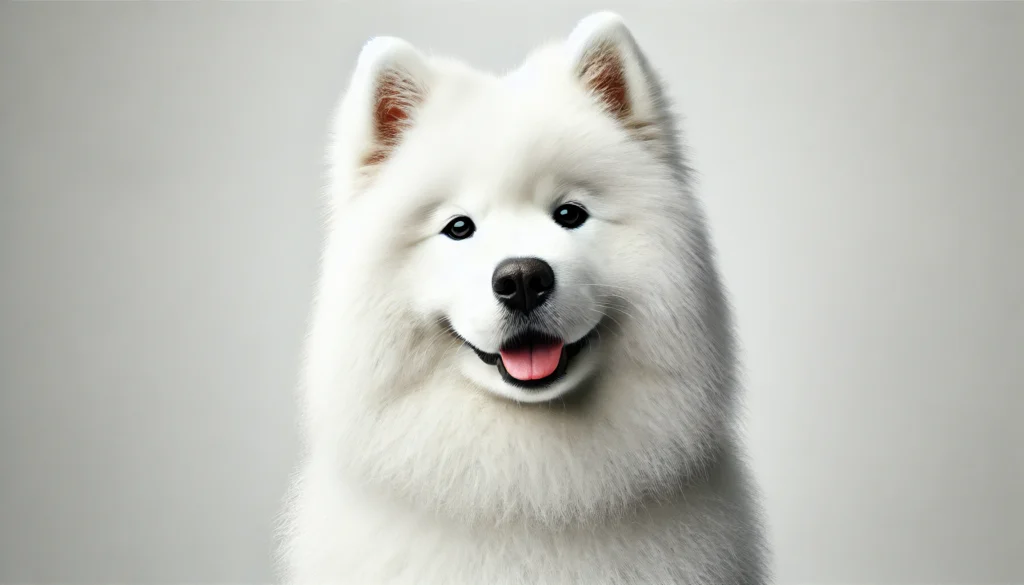Samoyed Dog Breed Amazing Health and Care Guide

Samoyeds, known for their fluffy white coats and cheerful demeanor, are more than just beautiful pets. They possess unique characteristics that make them beloved companions. With their friendly and playful temperament, Samoyeds have become popular among dog lovers worldwide. However, owning a Samoyed dog comes with responsibilities, especially regarding health and care. This article will explore the health concerns, preventive care, grooming, nutrition, exercise needs, and overall care for the Samoyed breed.

Understanding the Samoyed Breed
Before diving into the specifics of Samoyed care, it’s essential to understand this breed’s characteristics. Samoyeds, or “Sammy dogs,” were originally bred in Siberia by the Samoyede people to herd reindeer and pull sleds. They are strong, sturdy dogs, typically weighing between 35 to 65 pounds and standing about 19 to 24 inches tall. The lifespan of a Samoyed dog averages around 12 to 14 years, although many can live longer with proper care.
The temperament of Samoyeds is one of their most attractive features. They are known for their friendly and social nature, making them excellent family pets. Their intelligence and eagerness to please also contribute to their popularity. However, potential owners should consider the responsibilities that come with a Samoyed, including their grooming and exercise needs.
Common Health Concerns
Like all dog breeds, Samoyeds are prone to specific health issues. Being aware of these concerns can help owners take proactive steps to maintain their pet’s health.
1. Hip Dysplasia
Hip dysplasia is a hereditary condition affecting the hip joint’s development. In Samoyeds, this can lead to arthritis and mobility issues as they age. Symptoms may include difficulty rising, reluctance to exercise, and a swaying gait. Regular veterinary check-ups, maintaining a healthy weight, and providing joint supplements can help manage this condition.
2. Elbow Dysplasia
Similar to hip dysplasia, elbow dysplasia occurs when the elbow joint develops abnormally. This condition can lead to lameness and discomfort, particularly in active dogs. Treatment may involve medications, weight management, and sometimes surgery.
3. Progressive Retinal Atrophy (PRA)
PRA is a genetic condition that causes gradual degeneration of the retina, leading to vision loss. Samoyeds are susceptible to this condition, which can be diagnosed through genetic testing. Although there is no cure, many dogs adapt to their vision changes, and early diagnosis allows owners to make necessary adjustments in their dog’s environment.
4. Samoyed Hereditary Glomerulopathy
This is a genetic kidney disease affecting Samoyeds, leading to protein loss in urine and potentially resulting in kidney failure. Symptoms may include excessive thirst, increased urination, and lethargy. Genetic testing is available to identify carriers, and affected dogs may require special diets and medications.
5. Skin Issues
Samoyeds can be prone to skin allergies and conditions such as pyoderma, a bacterial skin infection. Symptoms may include itching, redness, and hair loss. Regular grooming and a nutritious diet can help maintain skin health, while persistent skin issues should be evaluated by a veterinarian.
6. Hypothyroidism
Hypothyroidism occurs when the thyroid gland does not produce enough hormones, leading to weight gain, lethargy, and skin issues. Regular blood tests can help monitor thyroid levels, and affected dogs can be managed with hormone replacement therapy.
7. Gastric Dilatation-Volvulus (Bloat)
While not specific to any breed, bloat can be life-threatening and is more common in deep-chested breeds like Samoyeds. Symptoms include a distended abdomen, restlessness, and attempts to vomit without success. Preventive measures include feeding smaller, more frequent meals and avoiding vigorous exercise immediately after eating.
Preventive Care
Preventive care is crucial for maintaining a Samoyed’s health. Here are some essential components:
Regular Veterinary Check-ups
Annual veterinary visits are vital for early detection of health issues. Regular vaccinations, dental cleanings, and health screenings can catch potential problems before they become serious.
Vaccinations
Samoyeds require core vaccinations, including rabies, distemper, parvovirus, and adenovirus. Discuss your dog’s vaccination schedule with your veterinarian to ensure they receive the necessary boosters.
Parasite Prevention
Regular flea, tick, and heartworm prevention is essential for your Samoyed’s health. Consult your veterinarian about the best products for your dog based on their lifestyle and environment.
Dental Care
Dental health is often overlooked but is essential for overall well-being. Regular brushing, dental chews, and professional cleanings can help prevent periodontal disease, which can lead to other health issues.
Nutrition
A balanced diet is crucial for a Samoyed’s health. Here are some guidelines for feeding your furry friend:
High-Quality Dog Food
Choose a high-quality dog food formulated for large breeds. Look for options that list meat as the first ingredient and avoid foods with fillers like corn and soy.
Nutritional Needs
Samoyeds have different nutritional needs depending on their age, activity level, and health status. Puppies require a diet higher in protein and fat for growth, while adult dogs need a balanced diet to maintain a healthy weight. Senior dogs may benefit from lower-calorie food to prevent obesity and joint issues.
Portion Control
Overfeeding can lead to obesity, which can exacerbate health issues like hip dysplasia and heart disease. Follow the feeding guidelines on the dog food package and adjust based on your dog’s activity level and weight. Regular weigh-ins can help you monitor your Samoyed’s weight.
Treats and Supplements
While treats can be a great training tool, they should be given in moderation. Healthy options include fruits and vegetables like carrots, apples, and blueberries. Consult your veterinarian about whether your Samoyed would benefit from supplements such as omega-3 fatty acids for coat and skin health or glucosamine for joint support.
Grooming
Grooming is essential for maintaining a Samoyed’s health and appearance. Their thick double coat requires regular care to prevent matting and skin issues.
Brushing
Samoyeds shed year-round but experience heavy shedding during spring and fall. Regular brushing (at least 2-3 times a week) is necessary to remove loose hair and prevent matting. During shedding seasons, daily brushing may be required.
Bathing
Samoyeds do not require frequent bathing, as their coat has natural oils that protect their skin. A bath every 1-3 months is usually sufficient, using a gentle dog shampoo. Over-bathing can strip the coat of these natural oils and lead to skin problems.
Nail Trimming
Regular nail trimming is important to prevent overgrowth, which can cause pain and difficulty walking. Aim to trim your Samoyed’s nails every 3-4 weeks or as needed.
Ear Cleaning
Check your Samoyed’s ears regularly for dirt and wax buildup. Clean them gently with a vet-recommended ear cleaner if needed. This helps prevent infections and keeps their ears healthy.
Exercise Requirements
Samoyeds are energetic and active dogs that require regular exercise to maintain their physical and mental health.
Daily Exercise
Aim for at least 1-2 hours of exercise each day, which can include walks, playtime, and mental stimulation activities. These dogs thrive on companionship and enjoy activities that involve their families.
Interactive Play
Engaging in games like fetch, tug-of-war, or agility training can provide both physical and mental exercise. Samoyeds enjoy challenges, so consider incorporating puzzle toys or training sessions into their routine to keep their minds sharp.
Socialization
Samoyeds are social dogs that benefit from regular interactions with other dogs and people. Puppy socialization classes are great for young Samoyeds, while adult dogs can benefit from dog parks or group training sessions.
Training and Socialization
Training is essential for any dog, but it’s particularly important for Samoyeds due to their intelligence and strong-willed nature.
Obedience Training
Start training early with basic commands like sit, stay, and come. Positive reinforcement methods work best, using treats and praise to encourage good behavior. Consistency and patience are key, as Samoyeds can be independent thinkers.
Socialization
Expose your Samoyed to various environments, people, and other animals from a young age. This helps them become well-adjusted adults and reduces the likelihood of behavioral issues.
Advanced Training
Once basic commands are mastered, consider advanced training in areas like agility, obedience, or even therapy work. These activities can provide mental stimulation and strengthen the bond between you and your dog.
do you know
Cat Skin Lumps, Bumps, and Cysts are terms often used interchangeably but they describe different issues under the skin. Lumps (like a lump on a cat’s neck or side) are generally larger and may be a sign of infection or tumors. Bumps (such as those on a cat’s head or paw) are usually smaller and less serious
Conclusion
Samoyeds are wonderful companions that bring joy and warmth into our lives. Their health and well-being are deeply intertwined with the care they receive from their owners. By understanding their specific health needs, providing proper nutrition, grooming, and exercise, and ensuring regular veterinary care, you can help your Samoyed lead a long, healthy, and happy life.
Whether you are considering adopting a Samoyed puppy or already own a fluffy companion, it’s essential to be aware of the Samoyed price range, which can vary based on factors like location and breeder reputation. The cost of a Samoyed can be significant, so ensure you are prepared for both initial expenses and ongoing care costs.
With their average lifespan of a Samoyed being around 12 to 14 years, it’s crucial to invest time and resources into their health and happiness. As you embark on this journey with your Samoyed dog, remember to cherish the moments and experiences that make having a Samoyed such a rewarding experience. By prioritizing their care, you’ll not only enjoy the companionship of these beautiful dogs but also contribute to their well-being, ensuring that your Samoyed.
How do you take care of a Samoyed dog?
Caring for a Samoyed involves regular grooming due to their thick, fluffy coats. They require daily brushing to minimize shedding and prevent matting. Samoyeds also need plenty of exercise and mental stimulation to stay healthy and happy. It’s important to provide them with a balanced diet, routine veterinary check-ups, and social interaction.
Is Samoyed a high maintenance dog?
Yes, Samoyeds are considered high maintenance. Their grooming needs are significant, requiring regular brushing and occasional professional grooming. They also need a lot of exercise and attention, making them a considerable commitment in terms of time and energy.
Is a Samoyed a good house dog?
Samoyeds can be excellent house dogs if their needs are properly met. They are known for their friendly and gentle temperament, making them great companions. However, they do best in homes where they have plenty of space to play and access to a yard.
What is good about Samoyeds?
Samoyeds are known for their friendly and sociable nature. They are often very affectionate with families and good with children. Their beautiful, fluffy coats and smiling faces are visually appealing, and they tend to be very adaptable and intelligent dogs.
What do Samoyed dogs eat?
Samoyeds should be fed a high-quality dog food that suits their age, size, and activity level. They generally do well on a diet that includes a balance of protein, fats, and carbohydrates. Always ensure fresh water is available, and monitor their food intake to prevent obesity.
Do Samoyeds do well in heat?
Samoyeds are better suited to cooler climates due to their dense fur coats. In warmer weather, they’re prone to overheating. Owners should provide them with shade, air conditioning, and plenty of water when temperatures rise.
Are Samoyeds prone to health problems?
Samoyeds are generally healthy, but like all breeds, they can be prone to certain health issues. Common concerns include hip dysplasia, cardiac disorders, and eye conditions. Regular vet visits and attention to health can help catch and manage these issues early.
Do Samoyeds get dirty easily?
Their white coats can make dirt quite visible, and they do tend to pick up debris from the outdoors. However, their fur also has a dirt-resistant quality that helps them stay cleaner than some other breeds. Regular grooming helps keep them clean and tidy.
Can a Samoyed be left alone?
Samoyeds are very social and may develop separation anxiety if left alone for long periods. They do best when they can interact regularly with their owners or have companionship throughout the day.
At what age is a Samoyed full grown?
Samoyeds typically reach full maturity around 12 to 18 months of age, though they may continue to fill out and muscle up until they’re about two years old.
Will a Samoyed protect its owner?
While Samoyeds are not aggressive dogs, they are very loyal and may act to protect their families if they perceive a threat. However, they are more likely to use their voice than their teeth in protective situations.
Can Samoyed sleep outside?
Samoyeds can sleep outside in cool weather due to their thick coats, which offer excellent insulation. However, they thrive on human companionship and should not be left outdoors all the time, especially in extreme weather conditions.






